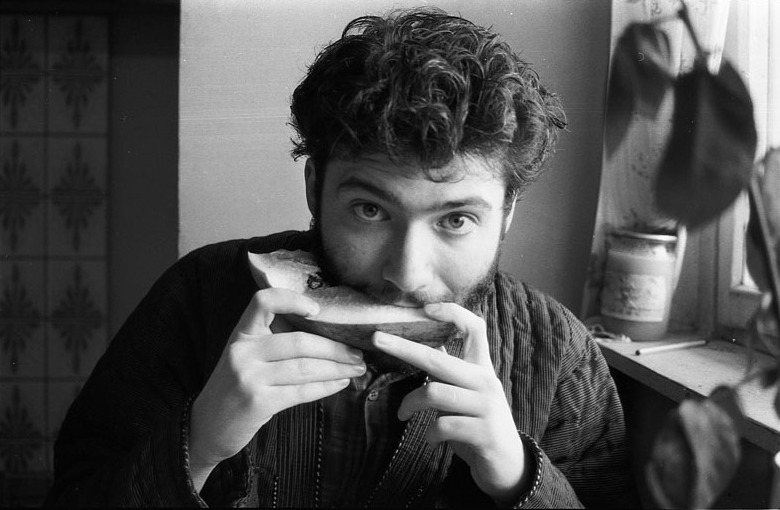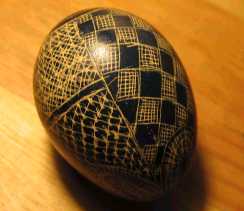|
Inspection Medical Hermeneutics
Inspection Medical Hermeneutics ( Инспекция Медицинская Герменевтика) was a pioneering artists’ collective formed in December 1987 in a squat in Furman Lane in Moscow. History The founding members of the group were Pavel Pepperstein, Sergei Anufriev, and Yuri Leiderman. An associate of the group, the journalist Anton Nosik, originally coined the phrase 'Medical Hermeneutics'. According to the OED, hermeneutics is the branch of knowledge that deals with interpretation, especially of the bible or literary texts. The group created installations and performances which experimented with language and meaning, imagining their work as an investigation of their culture at a time when Glasnost was opening it up to the West. They described Glasnost as a moment when ‘the sky opened up’, akin to psychedelic experience, when a rupture between systems brings anxiety as well as the promise of renewal. Their work drew from Russian traditions and fairy tales � ... [...More Info...] [...Related Items...] OR: [Wikipedia] [Google] [Baidu] |
Pavel Pepperstein
Pavel Pepperstein (né Pivovarov; born in 1966, Moscow, Russia) is a Russian artist and writer. Biography Pepperstein was born to Irina Pivovarova, an author of children’s books, and Viktor Pivovarov, a well-known painter. From 1985 to 1987, he studied at The Academy of Fine Arts in Prague. In 1987 he co-founded the experimental group of artists called Inspection Medical Hermeneutics (P.Pepperstein, S. Anufriev, Y.Liederman, V. Fedorov). The ideology of Medical Hermeneutics was the fusion of incompatible descriptive language, from contemporary western philosophy and Orthodox theology, Daoism and Buddhism to the language of psychiatry and pharmacology, which created a completely unique manner of expression. Since 1989 Pepperstein has been an independent artist, writer, critic, art theorist and rap musician. His work is a continuation of the tradition started by the Moscow Conceptual School. During 1994 he was Visiting Professor at the Städelschule in Frankfurt, Germany. Hi ... [...More Info...] [...Related Items...] OR: [Wikipedia] [Google] [Baidu] |
Yuri Leiderman
Yuri Leiderman (born in 1963, Odesa, Ukraine) is an artist and writer, one of the Moscow Conceptualists. He participated in apartment exhibitions in Moscow and Odesa since 1982. He graduated from the Moscow Institute of Chemical Technology named after D. Mendeleyev in 1987. He was one of the founding members of the "Medical Hermeneutics" group in 1987, leaving the group in 1990. He was awarded the Andrei Belyi literature prize in 2005. He was a member of the groups "Kapiton" and "Corbusier", 2008–2010. He was a participant in the 68th Venice International Film Festival. He resides and works in Berlin. Participation in biennale *Biennale Venedig 1993 und 2002 * Manifesta 1 1996 in Rotterdam *Biennale of Sydney 1998 *50th Venice Biennial in 2003 *Shanghai Biennale The Shanghai Biennale is one of the highest-profile contemporary art events in Shanghai and the most established art biennale in China. It was initially held in the Shanghai Art Museum. From 2012 on, it has been ho ... [...More Info...] [...Related Items...] OR: [Wikipedia] [Google] [Baidu] |
Hermeneutics
Hermeneutics () is the theory and methodology of interpretation, especially the interpretation of Biblical hermeneutics, biblical texts, wisdom literature, and Philosophy, philosophical texts. Hermeneutics is more than interpretative principles or methods used when immediate comprehension fails and includes the art of understanding and communication. #Modern hermeneutics, Modern hermeneutics includes both verbal and non-verbal communication''The Routledge Companion to Philosophy in Organization Studies'', Routledge, 2015, p. 113.Joann McNamara, ''From Dance to Text and Back to Dance: A Hermeneutics of Dance Interpretive Discourse'', PhD thesis, Texas Woman's University, 1994. as well as semiotics, presuppositions, and pre-understandings. Hermeneutics has been broadly applied in the humanities, especially in law, history and theology. Hermeneutics was initially applied to the interpretation, or exegesis, of Religious texts, scripture, and has been later broadened to questions of ... [...More Info...] [...Related Items...] OR: [Wikipedia] [Google] [Baidu] |
Glasnost
''Glasnost'' (; russian: link=no, гласность, ) has several general and specific meanings – a policy of maximum openness in the activities of state institutions and freedom of information, the inadmissibility of hushing up problems, and so on. It has been used in Russian to mean "openness and transparency" since at least the end of the 18th century. In the Russian Empire of the late-19th century, the term was particularly associated with reforms of the judicial system. Among these were reforms permitting attendance of the press and the public at trials whose verdicts were now to be read aloud. Vladimir Lenin repeatedly emphasized the importance of glasnost as the most important feature of democracy. In the mid-1980s, it was popularised by Mikhail Gorbachev as a political slogan for increased government transparency in the Soviet Union. Historical usage Human rights activist Lyudmila Alexeyeva argues that the word ''glasnost'' has been in the Russian language for s ... [...More Info...] [...Related Items...] OR: [Wikipedia] [Google] [Baidu] |
Moscow Conceptualism
The Moscow Conceptualist, or Russian Conceptualist, movement began with the Sots art of Komar and Melamid in the early 1970s, and continued as a trend in Russian art into the 1980s. It attempted to subvert socialist ideology using the strategies of conceptual art and appropriation art. It was an artistic counterpoint to Socialist Realism, and the artists experimented aesthetically in a wide range of media, including painting, sculpture, performance, and literature. The central figures were Dmitri Prigov, Ilya Kabakov, Irina Nakhova, Viktor Pivovarov, Eric Bulatov, Andrei Monastyrski and Komar and Melamid. Mikhail Epstein, in ''After the Future: The Paradoxes of Postmodernism and Contemporary Russian Culture'' (1995) explains why conceptualism is particularly appropriate to the culture and history of Russia, but also how it differs from Western Conceptualism: Epstein (1995) quotes Ilya Kabakov: The Moscow Conceptualist artists faced difficulties exhibiting their work in th ... [...More Info...] [...Related Items...] OR: [Wikipedia] [Google] [Baidu] |
Anti-Oedipus
''Anti-Oedipus: Capitalism and Schizophrenia'' (french: Capitalisme et schizophrénie. L'anti-Œdipe) is a 1972 book by French authors Gilles Deleuze and Félix Guattari, the former a philosopher and the latter a psychoanalyst. It is the first volume of their collaborative work ''Capitalism and Schizophrenia'', the second being ''A Thousand Plateaus'' (1980). In the book, Deleuze and Guattari developed the concepts and theories in schizoanalysis, a loose critical practice initiated from the standpoint of schizophrenia and psychosis as well as from the social progress that capitalism has spurred. They refer to psychoanalysis, economics, the creative arts, literature, anthropology and history in engagement with these concepts.Foucault (1977, 14). Contrary to contemporary French uses of the ideas of Sigmund Freud, they outlined a "materialist psychiatry" modeled on the unconscious regarded as an aggregate of productive processes of desire, incorporating their concept of desiring-produ ... [...More Info...] [...Related Items...] OR: [Wikipedia] [Google] [Baidu] |
Max Klinger
Max Klinger (18 February 1857 – 5 July 1920) was a German artist who produced significant work in painting, sculpture, prints and graphics, as well as writing a treatise articulating his ideas on art and the role of graphic arts and printmaking in relation to painting. He is associated with symbolism, the Vienna Secession, and Jugendstil (Youth Style) the German manifestation of Art Nouveau. He is best known today for his many prints, particularly a series entitled '' Paraphrase on the Finding of a Glove'' and his monumental sculptural installation in homage to Beethoven at the Vienna Secession in 1902.Delevoy, Robert L. (1978) ''Symbolists and Symbolism''. Skira/Rizzoli International Publications, Inc., New York, 247 pp. Cassou, Jean (1979) ''The Concise Encyclopedia of Symbolism''. Chartwell Books, Inc., Secaucus, New Jersey, 292 pp Life Klinger was born in Leipzig, Germany to a wealthy and prominent family. He enrolled in the Academy of Fine Arts in Karlsruhe in 1874 ... [...More Info...] [...Related Items...] OR: [Wikipedia] [Google] [Baidu] |
Kolobok
Kolobok ( Cyrillic: колобо́к) is the main character of an East Slavic national fairy tale with the same name, represented as a small yellow spherical being (bread). The fairy tale is prevalent in Slavic regions in a number of variations. A similar fairy tale with a pancake rolling off has also been recorded in German and Nordic regions. The plot is similar to The Gingerbread Man in English tradition. The Aarne-Thompson index classifies them in a common type 2025. Etymology The origin of word kolobok is not clear, and has several proposed versions: '' Фасмер М.'' ic.academic.ru/dic.nsf/vasmer/41322/колобв Этимологический словарь русского языка. Т. II. С. 292. * connected with Proto-Slavic: ''*klǫbъ'' ("Something twisted, has a round form, similar to a ball", "club"); * has appearance in lv, kukulītis ("a piece of bread"); * from Proto-Slavic: ''*kolo'' ("circle", "wheel"), that is, "that which is round and rollin ... [...More Info...] [...Related Items...] OR: [Wikipedia] [Google] [Baidu] |
Russian Contemporary Artists
Russian(s) refers to anything related to Russia, including: *Russians (, ''russkiye''), an ethnic group of the East Slavic peoples, primarily living in Russia and neighboring countries * Rossiyane (), Russian language term for all citizens and people of Russia, regardless of ethnicity *Russophone, Russian-speaking person (, ''russkogovoryashchy'', ''russkoyazychny'') * Russian language, the most widely spoken of the Slavic languages *Russian alphabet * Russian cuisine * Russian culture * Russian studies Russian may also refer to: * Russian dressing *''The Russians'', a book by Hedrick Smith * Russian (comics), fictional Marvel Comics supervillain from ''The Punisher'' series * Russian (solitaire), a card game * "Russians" (song), from the album ''The Dream of the Blue Turtles'' by Sting *"Russian", from the album ''Tubular Bells 2003'' by Mike Oldfield *"Russian", from the album '' '' by Caravan Palace * Nik Russian, the perpetrator of a con committed in 2002 *The South African n ... [...More Info...] [...Related Items...] OR: [Wikipedia] [Google] [Baidu] |





.jpg)